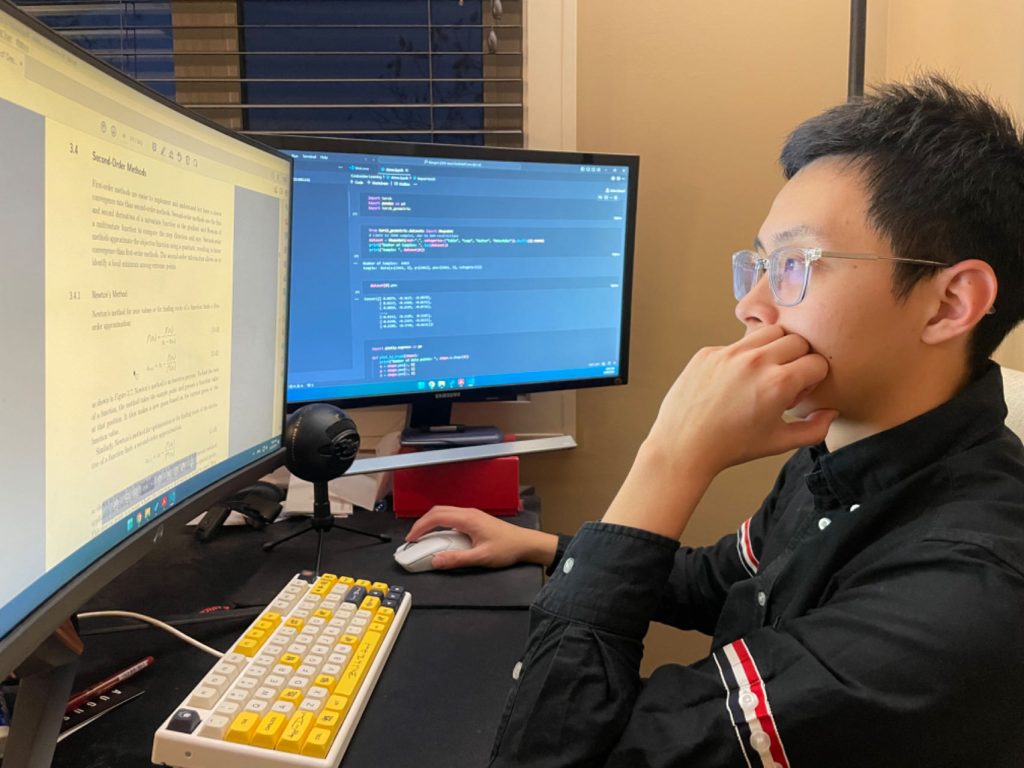Growing up in the port city of Xiamen in southern China, Xiangrui Liu used to periodically look out his window at the Taiwan Strait resting his eyes from working on his computer. Little did he know that years later, the ships navigating that body of water would be using technology he helped to develop to safeguard marine life.

Born in Quanzhou, Fujian Province of China, Liu had moved to Xiamen for a better education. His parents both made sacrifices for him to earn the best education available. They later moved to Singapore so Liu could finish high school. “I worked a bunch of part-time jobs just to get by,” explains Liu, “I worked as a part-time waiter and a private tutor supporting primary students in math and Chinese.”
It was his passion for computer science and math led him to UBC Okanagan. He initially applied to both UBC campuses, and it was the Okanagan that extended an offer. Despite being offered a transfer to the main campus, he elected to stay in Kelowna. “It didn’t hurt that Kelowna was a smaller size, less rain and more sunshine,” says Liu.
From the beginning, at Jumpstart, Liu embraced the opportunity to explore new culture. “When I think back to Jumpstart, I can still recall the vibe and it makes me feel like I am 20 again.” He quickly established a community and made lots of friends including other international students. “I moved frequently when I was young, but since living in Kelowna, it just feels like home.”
It wasn’t necessarily the fundamental engineering courses that caught Liu’s attention during his studies, but rather the courses that focused on computer science, machine learning and artificial intelligence. “It was the upper year undergraduate courses in AI that inspired me to pursue a Master’s,” explains Liu. He particularly enjoyed courses taught by Julian Cheng, Shan Du, Feng Chen and Mehran Shirazi.
Liu spent two years back in China (during the pandemic) after completing his undergraduate degree, but he missed Kelowna and sought to return. He teamed up with Cheng to undertake a unique research project that sought to assist marine vessels in avoiding marine live while out to sea.
“Xiangrui wasn’t an exceptional undergraduate student, but he certainly caught his stride during his graduate studies,” explains Cheng.
Liu’s research had been focused on speech-related topics, such as speech emotion recognition, voice activity detection, and acoustic signal classification. The transition to audio monitoring was rather seamless, and his findings have been well-received by field. The research uses advanced deep-learning techniques to accurately identify marine mammal types by listening to the sound collected from a hydrophone.

“I love photography, specifically natural scenery and wildlife here in Canada, so in a way this project allowed me to capture these environments using other technologies.”
Liu’s research was twice accepted by the Association for the Advancement of Artificial Intelligence (AAAI) Conference. The conference has a rigorous double-blind review process and low acceptance rate, which Cheng underscores the impact of Liu’s research. According to Liu, being recognized by the AAAI means he is capable of making meaningful contributions to the development of AI.
Liu defended his thesis in late 2023, and is expected to graduate this summer. He is setting his sights on pursuing a PhD and continuing to work in the AI space expanding his research to generative models for both speech and vision. “I hope to become a leader in the development of a safe and trustworthy AI.”